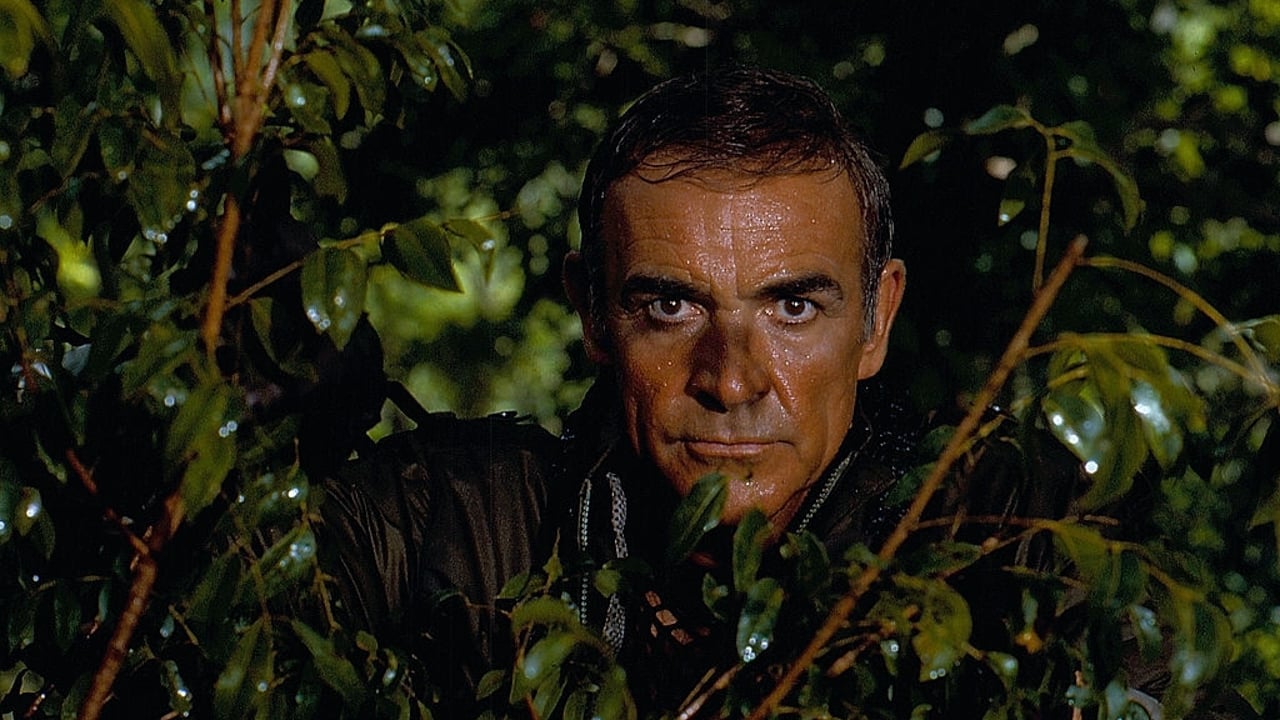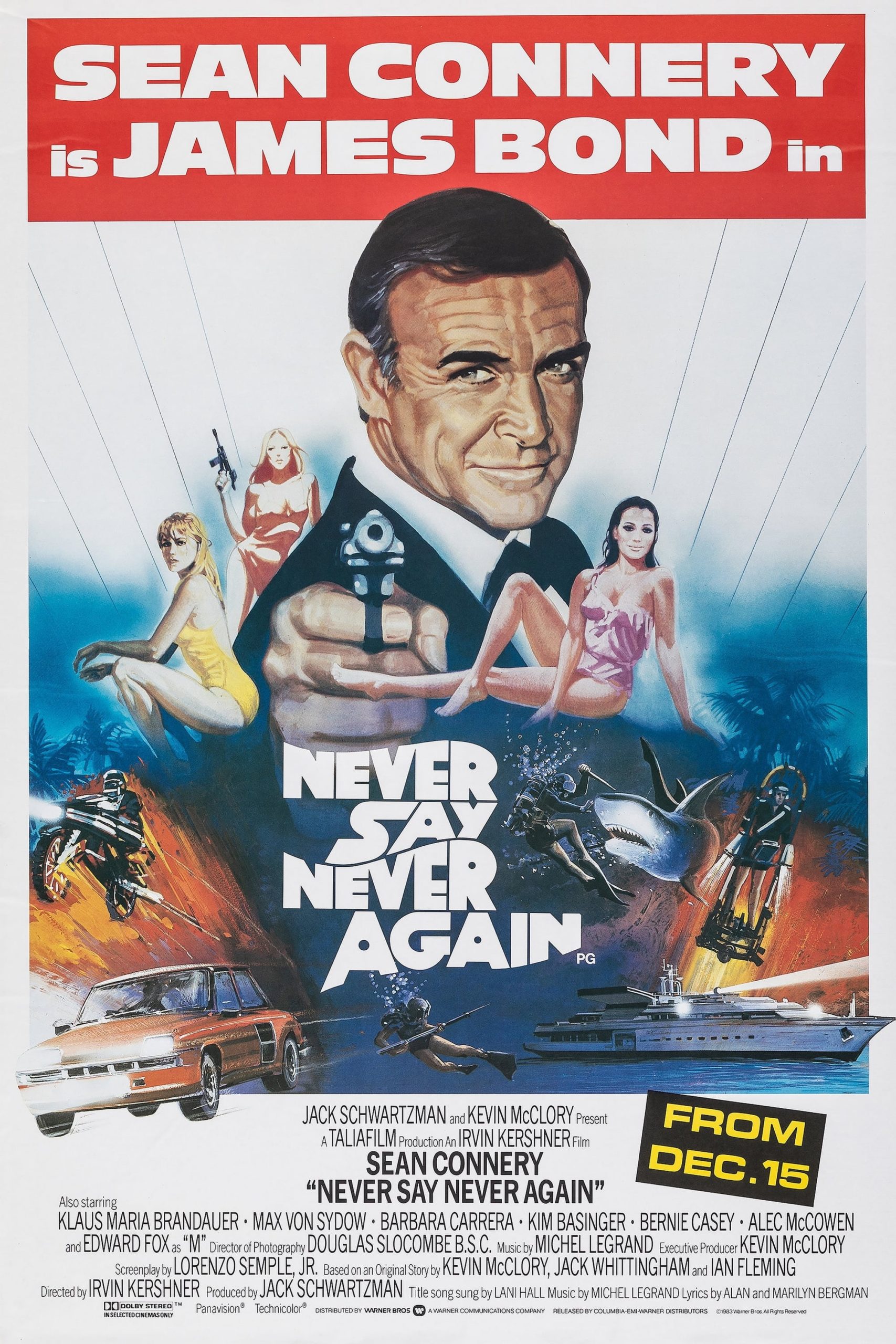
Prometheus unBond
A guide to all things Bond at Alternate Ending.
Directed by Irvin Kershner
Written by Lorenzo Semple, Jr.
Premiered 6 October, 1983
PRE-TITLE SEQUENCE
There isn't one. We should not takes this as a break with tradition, though; for reasons to be explained shortly, this isn't an "official" Bond movie.
TITLE SONG
Michel Legrand is responsible for some of the best film scores ever composed, which I don't mean in some vague "he writes good movie music" sense, but in the extremely specific and absolute "two of my top 10 movie scores of all time were composed by this man" sense; and his collaboration with married lyricists Marilyn and Alan Bergman, "The Windmills of My Mind", is one of the best film theme songs ever written. So a Bond theme made by this clutch of artists should have been a cakewalk, which makes it all the more befuddling and disappointing that "Never Say Never Again" is such a nightmare: howled incoherently by singer Lani Hall, the rickety '60s jazz pastiche tells, apparently, of a woman who's convinced that her sexual fortitude will tame a philandering man, but the only part I can swear to making out clearly is the chorus, which goes "Never, never say never again, never, never say never &c." Somehow, the tune manages to be cacaphonous even as it is the most banally soothing kind of elevator music, all in all such a miserable piece of muzaky shrillness as to rank near the bottom, not just of Bond themes, but of all the pieces ever written by its admirable creators.
Fun fact: the song features a trumpet solo by one Herb Alpert, Lani Hall's husband; he performed the instrumental title song for 1967's Casino Royale, the other unofficial James Bond feature.

Rating: 1 Shirley Bassey
TITLE SEQUENCE
This not being an Eon Productions film, there was of course no chance of the trademarked gun barrel opening, or Maurice Binder and his cavalcade of naked female silhouettes. That's no reason to give up trying, but trying does not look like this: a giant screen of transparent "007"s, though which we can see the action resolve itself, and then it's just credits appearing over a scene of our beloved secret agent fighting mercs in South America. They had to know they were going to be compared to the shinier franchise over yonder, for Christ's sake; a little effort couldn't have hurt.

Rating: 1 Silhouetted Woman
THE PLOT
Basically, it's the same as Thunderball. Not in the same way that Moonraker is basically the same as You Only Live Twice; this is actually, literally, a remake of Thunderball, because Thunderball is the only Bond story that producer Kevin McClory had the legal authority to tell.
The short version of the story goes like this: in 1958, Ian Fleming, the young filmmaker McClory, and McClory's colleague Jack Whittingham developed a story that was to serve as the first James Bond feature, though as such things will do, it fell apart into nothingness. Not, however, before Fleming used the bulk of the final version of the script as the basis for the 1961 novel Thunderball, for which he was promptly sued by McClory and Whittingham. The settlement that was reached gave McClory film rights to the story and Fleming prose rights; when Albert R. Broccoli and Harry Saltzman desired to make their adaptation of the book, they had to bring McClory on as producer, though they secured a binding agreement that he would make no attempt to develop another feature based on the material for a period of ten years.
In the end, Never Say Never Again came out a full 18 years after Thunderball, with more legal wrangling in the middle; but even more than the coup of making a legally-protected James Bond film that he didn't have to share with Broccoli at all, McClory managed to snag the ultimate victory by casting Sean Connery, the original cinematic 007, 12 years after he'd given up the part after Diamonds Are Forever (hence the title: Connery's wife Micheline playfully noting that he'd promised to "never again" play the spy for any sum of money). Broccoli had the last laugh when his own 1983 Bond picture, Octopussy, outgrossed Never Say Never Again, though both films made an exorbitant sum of money. Not enough for McClory to tell the story a third time (though he was allegedlhttps://www.alternateending.com/2012/08/a-bond-of-flesh.htmly developing another remake with future ex-Bond Timothy Dalton), which is kind of a disappointment, because that would have been aces.
And therefore, here we are: basically the same as Thunderball, in that the international criminal organisation SPECTRE has hijacked some nukes, and is holding the world hostage; this mission is being overseen by SPECTRE's second-in-command, Maximilian Largo (Klaus Maria Brandauer), his name Germaned up from the more Italian "Emilio". Bond stumbles into this plot by accident while he's recuperating at a spa, just like before; he is seduced and sidetracked by a SPECTRE agent, Fatima Blush (Barbera Carrera), just like before (she was called "Fiona Volpe" then); he still teams up with Largo's mistress, Domino Petachi (Kim Basinger), a reversion to the original script from "Domino Derval"; there's still a lot of fucking around underwater; there's a hugely impressive yacht called the Flying Saucer, which just goes to prove that everything is better in a foreign language, because there is no native speaker of English who wouldn't agree that Disco Volante isn't a better villainous boat name by several orders of magnitude.
Some of the changes work, some of them do not; some do both at once, like the streamlined way that Domino's brother is used as a dupe to get Largo the nukes (no absurd nonsense with plastic surgery this time around), except for the introduction of retinal scanners and the psychotic implication that SPECTRE has a copy of the right eyeball of the President of the United States. The final act is more exciting but the actual climax is much, much lamer (though what can compete with an out-of-control speeding hydrofoil?); the film's acknowledgement of Connery's age, worked subtly into the plot, is a huge improvement over Eon's desperate hope at the same time that nobody would notice that Roger Moore was functionally a mummy; Largo's video game headquarters, about which I will certainly say more later, is sub-moronic in a way that the most barrel-scraping nadir of the Eon films don't even day dream about. So let's call it a draw, and give it the same exact score.

Rating: 3.5 Stolen Nukes
THE VILLAIN
Klaus Maria Brandauer is an improvement over Adolfo Celi. That's just a straight-up fact, and we could spend time debating it, but that seems really fruitless. The twitchy German is one of those actors who always looks slightly psychotic doing anything at all, which makes it extra-terrifying when he admits that he probably is insane, in the same tone you or I might say, "yes, these are new shoes, thanks for noticing". Even some of the especially stupid things the movie has him do, such as challenge Bond to his world-domination holograph-based video game, seem vaguely menacing in Brandauer's hands. I mean, shit, he's obviously crazy, maybe he would have a massive video game with electrodes in the joysticks that could literally kill a man.
The bad news is, Max von Sydow is an improvement over Klaus Maria Brandauer just as objectively as Brandauer is an improvement over Celi, and von Sydow plays SPECTRE boss Ernst Stavro Blofeld in what amounts to an extended cameo, and it's really, really disappointing that we don't get to spend more time with him, which ruins Largo a little bit.

Rating: 3.5 Evil Cats
THE GIRL
I wouldn't go so far as to say that I hate Kim Basinger. It's just that, if she'd never had a professional acting career, there isn't a single performance whose loss I would regret. No, not even her Oscar-winning turn in L.A. Confidential. And sure as hell not her go as Domino mk2, a whimpering, personality-free gloss of "sexy" blondeness that feels at best like wannabe-slut teenager preening like she sees in the music videos. The script doesn't help her; she's given even less to do than Claudine Auger was. But it's all on Basinger that she flubs so completely the emotional arc that theoretically involves her rage at learning that Largo had her brother killed; Basinger's surly look of dismay that's meant to stand in for whatever complicated, angry emotions this kicks up in the character is so unpersuasive that it ends up severely damaging the film's climax, for when spoiler, but it's not like the film is full of surprises Domino kills Largo with a harpoon, we do not feel the surge of, "Hooray! She has reaped her bloody vengeance!" but instead something more like, "Why did she want... oh, right. Dead brother."
And not that I ought to go here, but she is a Bond Girl, and looks are part of it, and I've frankly never found her all that pretty.

Rating: 1.5 White Bikinis
THE HENCHMAN
Fatima Blush, whose name feels like it ought to be a dirty pun, but as far as I can tell isn't, is at once the best and worst character in Never Say Never Again: the best, since she is the the one who gets to be the doer, the ecstatically grubby sexual monster whose joy at getting to cause harm to Bond while also fucking him sideways is the most wiggy energy in the entire movie, while her employer just gets to stand there looking creepy and all Klaus Maria Brandauer-like. The worst, since the line separating all of that from "she's a goddamn cartoon character" is so very thin, and so frequently crossed, like the shot of her prancing - mother-fucking prancing - down stairs in high heels to go kill the spy. She's also the anchor of what is, hands down, the most uncomfortable sexism in the whole movie - and by the way, Connery's return is a swift reminder of how much less misogynist the Moore incarnation of Bond is - given how much her villainy is explicitly, particularly in her death scene, rendered as a particularly feminine sexual neuroticism.
But, y'know, Carrera is obviously having a ball playing her, and that goes a long way for me. So let's call it a push.

Rating: 3 Metal-Plated Teeth
THE SECONDARY GIRL WHO ENDS UP DEAD
I don't even know what to do here. The girl who filled this role in Thunderball comes back, played by Prunella Gee, and this time she has totally consensual, non-rapey sex with Bond; this part is fun and flirty and grown-up, and about as healthy as sexual relationships in Bond movies get. Then there's the unnamed woman on a boat (Valerie Leon), who has sex with Bond after the most unbelievably tortured collection of "banter" you could hope to see; it involves a set-up so forced and anal-retentive that it ceases to be Chekhov's Gun, and instead becomes Chekhov's Death Star Laser. Bond has a contact in the Bahamas, Nicole (Saskia Cohen Tanugi), with whom he does not have sex, and she is the only one who ends up dying. Also, Bond does sleep with Fatima, and she does end up dead, though that is clearly not her primary function. Basically I don't know what to do here: if I'm not mistaken, this is the film, in or out of the "real" franchise, where Bond has sex with the most women with speaking parts, which jumps the line from "adolescent wish-fulfillment" to "sex addict". What the hell, I'll throw it a bone for ramping back on the spa rape.

Rating: 3 Golden Corpses
ACTION SEQUENCES
You'd think that after so much Roger Moore, anything would be an improvement; but Connery was 52 at this point, and much is made of his own physical limitations, so the action is rather subdued for an action movie released in 1983, outside of one outstanding chase sequence with Bond on a rocket-powered motorbike. If it improves on the Moore films, it is because the film is more direct and physical; if it falls beneath them it's because there's no compensation in the form of the elaborate stunts that had become just another part of Bond's day at the office.
Once you deal with all that, there's still the undeniable presence of underwater action yet again, and this time it doesn't even have the limited appeal in Thunderball of sheer scale, so we're right back in "look at how slow the fighters move!" territory.

Rating: 2.5 Walther PPKs
GADGETRY
I like to think of it this way: no matter how cocksure he was that he had a better, nastier, Bondier Bond film than Broccoli did, McClory knew he was licked in one way: no Desmond Llewlyn. That, maybe, is why the quartermaster in this picture, though identified as "Q", is predominately referred to as Algy (Alec McCowen). Algy, if you're interested, is an overly-Cockney enthusiast, who cheerfully commiserates with Bond and does not ever glare at him with the hatred of a thousand impatient, unamused suns. This makes it hard for me, at least, to accept that he can really be the head of the MI6 weapons branch; maybe he's just an intern, or something.
But, we're here to talk gadgets, are we not? And while Eon was busy seriousing up their Bond by cutting down on the really idiotic gimmicks, Never Say Never Again jumps in with ebullience, giving us some real doozies: that rocket bike, for one, and there's also a personal hover-pad, jet-pack type of thing that is so much more ludicrous, and so much more fun, than the one in Thunderball. There's a watch with a laser built in, just exactly in time for Bond to carve his way out of manacles, 12 whole years before the mainline Bond got to play with such a toy in GoldenEye, and my favorite of all: an improbably thick fountain pen emblazoned with a giant Union Jack, that shoots explosions. I really don't know of a better way to describe it than that.

Rating: 4 Easily-Riled Welshmen
THE FIENDISH LAIR (and other sets)
Never Say Never Again was not a low-budget film; but it was also not as over-the-top expensive as the Eon Productions Bond films had become, and that never shows more clearly than in the production design by Stephen Grimes and Philip Harrison. It's not that it's "bad", as such; but it is, for the most part, extremely low key. The MI6 offices, for example, look depressingly like the actual base of operations for a government-run intelligence unit probably looked: flat lighting and lots of desks. The inside of Largo's boat is rather similar - it's impressive that so much stuff could be crammed into a yacht, but the stuff is not, itself, very exciting to look at. The staging area for the final conflict between Bond and Largo is kind of cool: an architectural hodge-podge of ancient Mediterranean cultures in a watery cave. But it looks very much like a set, lacking the physical realness that would put the idea over. The rest of it is all entirely plausible and well-mounted; but Jesus, we're not going to Bond movies for plausible now, are we?

Rating: 2 Volcano Fortresses
ELEGANT LIFESTYLE PORN
Perhaps as another way of distinguishing Connery's return from Moore's work - because, in all honesty, there are plenty of places where Moore isn't really doing much besides looking outrageously at home in formalwear - Never Say Never Again gives us a rather dirtier, more workaday Bond, which fits in well with the film's exploration of what it means to be James Bond at the dawn of one's 50s, when one is rather more of an aging specimen than a suave, adventuresome playboy. That said, there is one scene where Connery, rocking a tuxedo as well as he ever did, plows through a fancy party and ends up by executing a flawless (if largely unambitious) tango. That this sequence is interrupted by the singularly non-elegant video game deathmatch wounds it, but not quite to the point that it cannot recover.

Rating: 2 Vodka Martinis
APPEARANCE OF "BOND. JAMES BOND."
Bond formally introduces himself to Domino, while standing in front of a Gravitar machine in Largo's arcade parlor.
Forced or Badass? Very, very forced. Did you see the part about the Gravitar machine?
BEST QUIP
FATIMA BLUSH: "You know that making love to Fatima was the greatest pleasure of your life."
BOND: "Well, to be perfectly honest, there was this girl in Philadelphia..."
ADDITIONAL COMMENTS
Given the sort of average things I've said so far, this is maybe not exactly what you were expecting to hear in this space: I fucking hate Never Say Never Again. It is not my least favorite Bond film, nor do I think it is the worst (and no, I don't have the same pick for those two superlatives), but there's virtually nothing about it that gives me pleasure in any active way besides the villains. Even the sight of Connery back in the role that made him a superstar is a cold comfort; in part because it's not new the way it was in '83; I, for one, came to Never Say Never Again the exact same way and at the same time that I came to the initial six Connery Bond films, so it doesn't feel like a years-later revival of those movies, so much as an ugly, unwanted epilogue, in which the character who was so iconic and perfect is reduced to a self-conscious joke.
Oh my god, the jokes. The Moore-era films, on the whole, are lousy with puns and quips and sight gags, even the most grounded ones. Moore himself does a lot to save them from the excess this might bring in, because his performance is such a perfect mixture of twinkle and gravitas: "Yes, we're having such fun; but don't forget, I have to go kill people now". But even without that, his films are all still far more serious than Never Say Never Again, which dives right into slapstick comedy, and never emerges, nor especially tries to: the ghastly business with a fisherwoman "catching" Bond, and the litany of "wah-wah" reaction shots from the various baddies that Bond outwits are the low points, but for fully the first two-thirds of the movie, it's like nobody involved has any idea of how to take a spy thriller even remotely seriously. Particularly Connery, whose attraction to the role, if it consisted of anything but a paycheck, is not visible in his performance, which is the laziest and most self-amused of his seven attempts at the character, and it's one of the most unenjoyable things he's ever done on screen period, in my estimation.
And then, way the hell over there, we have director Irvin Kershner, fresh off The Empire Strikes Back, where he was able to successful marry gung-ho popcorn movie nonsense with genuine emotion and gravity; I gather he was hoping to pull of a similar trick here, for the movie is directed with unexpected slowness and precision - it is one of the few Bond movies ever with a clear, consistent directorial style, in fact, one that attempts constantly to emphasise the autumnal side of the story, of Connery's aging face, and of the sometimes laconic action. It jars badly with the flippant screenplay, though not as badly as might have been the case; and while the film is a long 134 minutes (oddly, of all the Bond films to this point, the two unofficial entries are the second- and third-longest), it's really not even as bloated as Thunderball itself, with its inability to get its first act going.
Kershner's attempt to do anything at all with the material is a small measure, though, in the face of everything that goes wrong: everything I've mentioned, though I want to emphasise, again that this is a Bond movie that for no apparent reason wants to have a long video game battle in the middle, and while I bet it was the coolest thing in 1983, it serves only to make this the most dated of all Bond movies today - and that, again, this movie proves how powerful and charismatic the villain is by giving him a video arcade in the middle of his villa.
There are other nasty little problems: Edward Fox's M is a whiny, sarcastic shit who doesn't deserve to be named in the same lifetime as Bernard Lee's exhausted, fatherly spy master, or even Robert Brown's curt but impersonal boss. Michel Legrand's score is jazzy and sexy and cool and it is mired in the French crime cinema of the late '50s, and sounds wrong for a Bond film in general, but especially a Bond film from the '80s. Douglas Slocombe's cinematography - no slouch he, the man who shot the first three Indiana Jones pictures - is muddled and brown for the most part, with unpleasantly flat interiors.
I really don't have anything nice to say about this movie. It is not, like the very worst of the Eon Bond pictures, viciously stupid; we do not have earthquake machines or space laser battles or fencing pop stars or Dr. Christmas Jones to turn things from "bad" to "suicidally bad". But oh, how I wish that Connery had simply stayed retired, and not let this clunky irritant be his last word on the character that is to such a large degree responsible for his career and his star persona.
OVERALL SCORE
27/55 [eq. 29.45/60]
Directed by Irvin Kershner
Written by Lorenzo Semple, Jr.
Premiered 6 October, 1983
PRE-TITLE SEQUENCE
There isn't one. We should not takes this as a break with tradition, though; for reasons to be explained shortly, this isn't an "official" Bond movie.
TITLE SONG
Michel Legrand is responsible for some of the best film scores ever composed, which I don't mean in some vague "he writes good movie music" sense, but in the extremely specific and absolute "two of my top 10 movie scores of all time were composed by this man" sense; and his collaboration with married lyricists Marilyn and Alan Bergman, "The Windmills of My Mind", is one of the best film theme songs ever written. So a Bond theme made by this clutch of artists should have been a cakewalk, which makes it all the more befuddling and disappointing that "Never Say Never Again" is such a nightmare: howled incoherently by singer Lani Hall, the rickety '60s jazz pastiche tells, apparently, of a woman who's convinced that her sexual fortitude will tame a philandering man, but the only part I can swear to making out clearly is the chorus, which goes "Never, never say never again, never, never say never &c." Somehow, the tune manages to be cacaphonous even as it is the most banally soothing kind of elevator music, all in all such a miserable piece of muzaky shrillness as to rank near the bottom, not just of Bond themes, but of all the pieces ever written by its admirable creators.
Fun fact: the song features a trumpet solo by one Herb Alpert, Lani Hall's husband; he performed the instrumental title song for 1967's Casino Royale, the other unofficial James Bond feature.
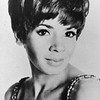
Rating: 1 Shirley Bassey
TITLE SEQUENCE
This not being an Eon Productions film, there was of course no chance of the trademarked gun barrel opening, or Maurice Binder and his cavalcade of naked female silhouettes. That's no reason to give up trying, but trying does not look like this: a giant screen of transparent "007"s, though which we can see the action resolve itself, and then it's just credits appearing over a scene of our beloved secret agent fighting mercs in South America. They had to know they were going to be compared to the shinier franchise over yonder, for Christ's sake; a little effort couldn't have hurt.

Rating: 1 Silhouetted Woman
THE PLOT
Basically, it's the same as Thunderball. Not in the same way that Moonraker is basically the same as You Only Live Twice; this is actually, literally, a remake of Thunderball, because Thunderball is the only Bond story that producer Kevin McClory had the legal authority to tell.
The short version of the story goes like this: in 1958, Ian Fleming, the young filmmaker McClory, and McClory's colleague Jack Whittingham developed a story that was to serve as the first James Bond feature, though as such things will do, it fell apart into nothingness. Not, however, before Fleming used the bulk of the final version of the script as the basis for the 1961 novel Thunderball, for which he was promptly sued by McClory and Whittingham. The settlement that was reached gave McClory film rights to the story and Fleming prose rights; when Albert R. Broccoli and Harry Saltzman desired to make their adaptation of the book, they had to bring McClory on as producer, though they secured a binding agreement that he would make no attempt to develop another feature based on the material for a period of ten years.
In the end, Never Say Never Again came out a full 18 years after Thunderball, with more legal wrangling in the middle; but even more than the coup of making a legally-protected James Bond film that he didn't have to share with Broccoli at all, McClory managed to snag the ultimate victory by casting Sean Connery, the original cinematic 007, 12 years after he'd given up the part after Diamonds Are Forever (hence the title: Connery's wife Micheline playfully noting that he'd promised to "never again" play the spy for any sum of money). Broccoli had the last laugh when his own 1983 Bond picture, Octopussy, outgrossed Never Say Never Again, though both films made an exorbitant sum of money. Not enough for McClory to tell the story a third time (though he was allegedlhttps://www.alternateending.com/2012/08/a-bond-of-flesh.htmly developing another remake with future ex-Bond Timothy Dalton), which is kind of a disappointment, because that would have been aces.
And therefore, here we are: basically the same as Thunderball, in that the international criminal organisation SPECTRE has hijacked some nukes, and is holding the world hostage; this mission is being overseen by SPECTRE's second-in-command, Maximilian Largo (Klaus Maria Brandauer), his name Germaned up from the more Italian "Emilio". Bond stumbles into this plot by accident while he's recuperating at a spa, just like before; he is seduced and sidetracked by a SPECTRE agent, Fatima Blush (Barbera Carrera), just like before (she was called "Fiona Volpe" then); he still teams up with Largo's mistress, Domino Petachi (Kim Basinger), a reversion to the original script from "Domino Derval"; there's still a lot of fucking around underwater; there's a hugely impressive yacht called the Flying Saucer, which just goes to prove that everything is better in a foreign language, because there is no native speaker of English who wouldn't agree that Disco Volante isn't a better villainous boat name by several orders of magnitude.
Some of the changes work, some of them do not; some do both at once, like the streamlined way that Domino's brother is used as a dupe to get Largo the nukes (no absurd nonsense with plastic surgery this time around), except for the introduction of retinal scanners and the psychotic implication that SPECTRE has a copy of the right eyeball of the President of the United States. The final act is more exciting but the actual climax is much, much lamer (though what can compete with an out-of-control speeding hydrofoil?); the film's acknowledgement of Connery's age, worked subtly into the plot, is a huge improvement over Eon's desperate hope at the same time that nobody would notice that Roger Moore was functionally a mummy; Largo's video game headquarters, about which I will certainly say more later, is sub-moronic in a way that the most barrel-scraping nadir of the Eon films don't even day dream about. So let's call it a draw, and give it the same exact score.

Rating: 3.5 Stolen Nukes
THE VILLAIN
Klaus Maria Brandauer is an improvement over Adolfo Celi. That's just a straight-up fact, and we could spend time debating it, but that seems really fruitless. The twitchy German is one of those actors who always looks slightly psychotic doing anything at all, which makes it extra-terrifying when he admits that he probably is insane, in the same tone you or I might say, "yes, these are new shoes, thanks for noticing". Even some of the especially stupid things the movie has him do, such as challenge Bond to his world-domination holograph-based video game, seem vaguely menacing in Brandauer's hands. I mean, shit, he's obviously crazy, maybe he would have a massive video game with electrodes in the joysticks that could literally kill a man.
The bad news is, Max von Sydow is an improvement over Klaus Maria Brandauer just as objectively as Brandauer is an improvement over Celi, and von Sydow plays SPECTRE boss Ernst Stavro Blofeld in what amounts to an extended cameo, and it's really, really disappointing that we don't get to spend more time with him, which ruins Largo a little bit.

Rating: 3.5 Evil Cats
THE GIRL
I wouldn't go so far as to say that I hate Kim Basinger. It's just that, if she'd never had a professional acting career, there isn't a single performance whose loss I would regret. No, not even her Oscar-winning turn in L.A. Confidential. And sure as hell not her go as Domino mk2, a whimpering, personality-free gloss of "sexy" blondeness that feels at best like wannabe-slut teenager preening like she sees in the music videos. The script doesn't help her; she's given even less to do than Claudine Auger was. But it's all on Basinger that she flubs so completely the emotional arc that theoretically involves her rage at learning that Largo had her brother killed; Basinger's surly look of dismay that's meant to stand in for whatever complicated, angry emotions this kicks up in the character is so unpersuasive that it ends up severely damaging the film's climax, for when spoiler, but it's not like the film is full of surprises Domino kills Largo with a harpoon, we do not feel the surge of, "Hooray! She has reaped her bloody vengeance!" but instead something more like, "Why did she want... oh, right. Dead brother."
And not that I ought to go here, but she is a Bond Girl, and looks are part of it, and I've frankly never found her all that pretty.
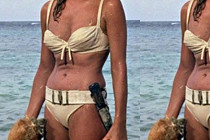
Rating: 1.5 White Bikinis
THE HENCHMAN
Fatima Blush, whose name feels like it ought to be a dirty pun, but as far as I can tell isn't, is at once the best and worst character in Never Say Never Again: the best, since she is the the one who gets to be the doer, the ecstatically grubby sexual monster whose joy at getting to cause harm to Bond while also fucking him sideways is the most wiggy energy in the entire movie, while her employer just gets to stand there looking creepy and all Klaus Maria Brandauer-like. The worst, since the line separating all of that from "she's a goddamn cartoon character" is so very thin, and so frequently crossed, like the shot of her prancing - mother-fucking prancing - down stairs in high heels to go kill the spy. She's also the anchor of what is, hands down, the most uncomfortable sexism in the whole movie - and by the way, Connery's return is a swift reminder of how much less misogynist the Moore incarnation of Bond is - given how much her villainy is explicitly, particularly in her death scene, rendered as a particularly feminine sexual neuroticism.
But, y'know, Carrera is obviously having a ball playing her, and that goes a long way for me. So let's call it a push.
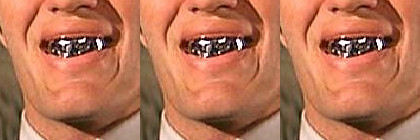
Rating: 3 Metal-Plated Teeth
THE SECONDARY GIRL WHO ENDS UP DEAD
I don't even know what to do here. The girl who filled this role in Thunderball comes back, played by Prunella Gee, and this time she has totally consensual, non-rapey sex with Bond; this part is fun and flirty and grown-up, and about as healthy as sexual relationships in Bond movies get. Then there's the unnamed woman on a boat (Valerie Leon), who has sex with Bond after the most unbelievably tortured collection of "banter" you could hope to see; it involves a set-up so forced and anal-retentive that it ceases to be Chekhov's Gun, and instead becomes Chekhov's Death Star Laser. Bond has a contact in the Bahamas, Nicole (Saskia Cohen Tanugi), with whom he does not have sex, and she is the only one who ends up dying. Also, Bond does sleep with Fatima, and she does end up dead, though that is clearly not her primary function. Basically I don't know what to do here: if I'm not mistaken, this is the film, in or out of the "real" franchise, where Bond has sex with the most women with speaking parts, which jumps the line from "adolescent wish-fulfillment" to "sex addict". What the hell, I'll throw it a bone for ramping back on the spa rape.

Rating: 3 Golden Corpses
ACTION SEQUENCES
You'd think that after so much Roger Moore, anything would be an improvement; but Connery was 52 at this point, and much is made of his own physical limitations, so the action is rather subdued for an action movie released in 1983, outside of one outstanding chase sequence with Bond on a rocket-powered motorbike. If it improves on the Moore films, it is because the film is more direct and physical; if it falls beneath them it's because there's no compensation in the form of the elaborate stunts that had become just another part of Bond's day at the office.
Once you deal with all that, there's still the undeniable presence of underwater action yet again, and this time it doesn't even have the limited appeal in Thunderball of sheer scale, so we're right back in "look at how slow the fighters move!" territory.

Rating: 2.5 Walther PPKs
GADGETRY
I like to think of it this way: no matter how cocksure he was that he had a better, nastier, Bondier Bond film than Broccoli did, McClory knew he was licked in one way: no Desmond Llewlyn. That, maybe, is why the quartermaster in this picture, though identified as "Q", is predominately referred to as Algy (Alec McCowen). Algy, if you're interested, is an overly-Cockney enthusiast, who cheerfully commiserates with Bond and does not ever glare at him with the hatred of a thousand impatient, unamused suns. This makes it hard for me, at least, to accept that he can really be the head of the MI6 weapons branch; maybe he's just an intern, or something.
But, we're here to talk gadgets, are we not? And while Eon was busy seriousing up their Bond by cutting down on the really idiotic gimmicks, Never Say Never Again jumps in with ebullience, giving us some real doozies: that rocket bike, for one, and there's also a personal hover-pad, jet-pack type of thing that is so much more ludicrous, and so much more fun, than the one in Thunderball. There's a watch with a laser built in, just exactly in time for Bond to carve his way out of manacles, 12 whole years before the mainline Bond got to play with such a toy in GoldenEye, and my favorite of all: an improbably thick fountain pen emblazoned with a giant Union Jack, that shoots explosions. I really don't know of a better way to describe it than that.

Rating: 4 Easily-Riled Welshmen
THE FIENDISH LAIR (and other sets)
Never Say Never Again was not a low-budget film; but it was also not as over-the-top expensive as the Eon Productions Bond films had become, and that never shows more clearly than in the production design by Stephen Grimes and Philip Harrison. It's not that it's "bad", as such; but it is, for the most part, extremely low key. The MI6 offices, for example, look depressingly like the actual base of operations for a government-run intelligence unit probably looked: flat lighting and lots of desks. The inside of Largo's boat is rather similar - it's impressive that so much stuff could be crammed into a yacht, but the stuff is not, itself, very exciting to look at. The staging area for the final conflict between Bond and Largo is kind of cool: an architectural hodge-podge of ancient Mediterranean cultures in a watery cave. But it looks very much like a set, lacking the physical realness that would put the idea over. The rest of it is all entirely plausible and well-mounted; but Jesus, we're not going to Bond movies for plausible now, are we?
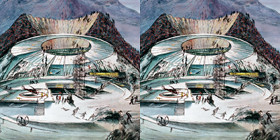
Rating: 2 Volcano Fortresses
ELEGANT LIFESTYLE PORN
Perhaps as another way of distinguishing Connery's return from Moore's work - because, in all honesty, there are plenty of places where Moore isn't really doing much besides looking outrageously at home in formalwear - Never Say Never Again gives us a rather dirtier, more workaday Bond, which fits in well with the film's exploration of what it means to be James Bond at the dawn of one's 50s, when one is rather more of an aging specimen than a suave, adventuresome playboy. That said, there is one scene where Connery, rocking a tuxedo as well as he ever did, plows through a fancy party and ends up by executing a flawless (if largely unambitious) tango. That this sequence is interrupted by the singularly non-elegant video game deathmatch wounds it, but not quite to the point that it cannot recover.

Rating: 2 Vodka Martinis
APPEARANCE OF "BOND. JAMES BOND."
Bond formally introduces himself to Domino, while standing in front of a Gravitar machine in Largo's arcade parlor.
Forced or Badass? Very, very forced. Did you see the part about the Gravitar machine?
BEST QUIP
FATIMA BLUSH: "You know that making love to Fatima was the greatest pleasure of your life."
BOND: "Well, to be perfectly honest, there was this girl in Philadelphia..."
ADDITIONAL COMMENTS
Given the sort of average things I've said so far, this is maybe not exactly what you were expecting to hear in this space: I fucking hate Never Say Never Again. It is not my least favorite Bond film, nor do I think it is the worst (and no, I don't have the same pick for those two superlatives), but there's virtually nothing about it that gives me pleasure in any active way besides the villains. Even the sight of Connery back in the role that made him a superstar is a cold comfort; in part because it's not new the way it was in '83; I, for one, came to Never Say Never Again the exact same way and at the same time that I came to the initial six Connery Bond films, so it doesn't feel like a years-later revival of those movies, so much as an ugly, unwanted epilogue, in which the character who was so iconic and perfect is reduced to a self-conscious joke.
Oh my god, the jokes. The Moore-era films, on the whole, are lousy with puns and quips and sight gags, even the most grounded ones. Moore himself does a lot to save them from the excess this might bring in, because his performance is such a perfect mixture of twinkle and gravitas: "Yes, we're having such fun; but don't forget, I have to go kill people now". But even without that, his films are all still far more serious than Never Say Never Again, which dives right into slapstick comedy, and never emerges, nor especially tries to: the ghastly business with a fisherwoman "catching" Bond, and the litany of "wah-wah" reaction shots from the various baddies that Bond outwits are the low points, but for fully the first two-thirds of the movie, it's like nobody involved has any idea of how to take a spy thriller even remotely seriously. Particularly Connery, whose attraction to the role, if it consisted of anything but a paycheck, is not visible in his performance, which is the laziest and most self-amused of his seven attempts at the character, and it's one of the most unenjoyable things he's ever done on screen period, in my estimation.
And then, way the hell over there, we have director Irvin Kershner, fresh off The Empire Strikes Back, where he was able to successful marry gung-ho popcorn movie nonsense with genuine emotion and gravity; I gather he was hoping to pull of a similar trick here, for the movie is directed with unexpected slowness and precision - it is one of the few Bond movies ever with a clear, consistent directorial style, in fact, one that attempts constantly to emphasise the autumnal side of the story, of Connery's aging face, and of the sometimes laconic action. It jars badly with the flippant screenplay, though not as badly as might have been the case; and while the film is a long 134 minutes (oddly, of all the Bond films to this point, the two unofficial entries are the second- and third-longest), it's really not even as bloated as Thunderball itself, with its inability to get its first act going.
Kershner's attempt to do anything at all with the material is a small measure, though, in the face of everything that goes wrong: everything I've mentioned, though I want to emphasise, again that this is a Bond movie that for no apparent reason wants to have a long video game battle in the middle, and while I bet it was the coolest thing in 1983, it serves only to make this the most dated of all Bond movies today - and that, again, this movie proves how powerful and charismatic the villain is by giving him a video arcade in the middle of his villa.
There are other nasty little problems: Edward Fox's M is a whiny, sarcastic shit who doesn't deserve to be named in the same lifetime as Bernard Lee's exhausted, fatherly spy master, or even Robert Brown's curt but impersonal boss. Michel Legrand's score is jazzy and sexy and cool and it is mired in the French crime cinema of the late '50s, and sounds wrong for a Bond film in general, but especially a Bond film from the '80s. Douglas Slocombe's cinematography - no slouch he, the man who shot the first three Indiana Jones pictures - is muddled and brown for the most part, with unpleasantly flat interiors.
I really don't have anything nice to say about this movie. It is not, like the very worst of the Eon Bond pictures, viciously stupid; we do not have earthquake machines or space laser battles or fencing pop stars or Dr. Christmas Jones to turn things from "bad" to "suicidally bad". But oh, how I wish that Connery had simply stayed retired, and not let this clunky irritant be his last word on the character that is to such a large degree responsible for his career and his star persona.
OVERALL SCORE
27/55 [eq. 29.45/60]
Categories: action, british cinema, james bond, needless remakes, spy films, thrillers

